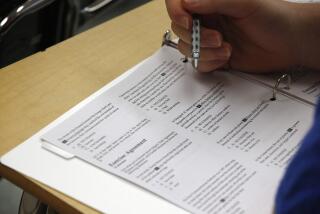College to Test Policy of Making SAT Optional
- Share via
Pitzer College announced Friday that it will launch a three-year trial, lifting the requirement for applicants to submit SAT scores for admissions decisions.
The action makes the Claremont school the first selective liberal arts college in California, and apparently on the West Coast, to make college entrance exams optional.
Admissions experts estimate that two dozen selective liberal arts colleges nationwide, including Bowdoin in Maine and Mount Holyoke in Massachusetts, make the SAT optional. The results for schools experimenting with the approach have been mixed, prompting some to reinstate the requirements.
Proponents of an optional SAT say the policy opens doors for good students who perform poorly on standardized tests, including many minority students and others from low-income families or poor high schools. Others, however, say the policies mean that admissions officers lose a tool for evaluating applicants.
In addition, skeptics in admissions circles speculate that some colleges drop the exam requirement to boost their standings in closely watched national college rankings, which are based partly on the average SAT scores of freshmen. By enabling students with relatively poor SATs to withhold scores, they say, colleges can inflate the averages they report to publications that compile annual rankings, such as U.S. News & World Report.
Laura Skandera Trombley, named president of Pitzer last year, said that “what’s driving our decision is our commitment to our values and to our mission,” including the school’s efforts to promote diversity.
She deflected questions about whether magazine rankings were motivating the change. She emphasized, however, that “all colleges are interested in U.S. News, and to rise in the rankings is probably something that is seen as a benefit at times. We certainly have known for 40 years we’re a quality institution. It’s certainly enjoyable when external indicators recognize our excellence as well.”
Pitzer, founded in 1963, is the youngest of the five undergraduate institutions in the Claremont Colleges consortium. With about 900 students, it is best known for social sciences and interdisciplinary studies.
In the most recent U.S. News rankings, Pitzer was listed as a second-tier liberal arts college, putting it roughly in the nation’s top 100. The other four Claremont undergraduate schools -- Pomona, Harvey Mudd, Claremont McKenna and Scripps -- are in the first tier of about 50.
Pitzer’s optional-SAT program, which will begin with the class entering in the fall of 2004, exempts high school students with a grade-point average of 3.5 in academic subjects, or those finishing in the top 10% of their graduating classes, from submitting any form of college entrance exam results. Students with weaker credentials also can be excused if they send in graded analytical writing samples and graded exams in advanced mathematics.
The idea of waiving SAT tests is nothing new in California. The 23-campus California State University system doesn’t require SAT scores from applicants with averages of 3.0 or better.
The University of California, the SAT’s biggest client, considered scrapping use of the exams after UC President Richard Atkinson questioned their value and fairness two years ago. However, UC kept the test after the College Board announced an SAT overhaul.
Pitzer’s decision was a compromise fashioned after a bid to eliminate the SAT ran into opposition. Still, debate lingers.
Nathan Rosenberg, a Pitzer sophomore and editor in chief of Claremont Student magazine, said he didn’t see the benefit, since Pitzer already accepts students with weaker SAT scores if they show other academic strengths. “By giving students a chance not to turn in their SATs, it’s just one less thing that admissions can look at,” he said.
He said Pitzer was taking this step, in part, because “the school prides itself on being progressive and far-left.”
But Jennifer Thompson, the president of Pitzer’s Student Senate, said she was excited about the decision.
“I think the standardized testing does have a bias, and I hope this has a positive impact on our admissions. I’m curious to see if it does encourage students who would not have applied previously.”
*
Times staff writer Rebecca Trounson contributed to this report.
More to Read
Sign up for Essential California
The most important California stories and recommendations in your inbox every morning.
You may occasionally receive promotional content from the Los Angeles Times.













